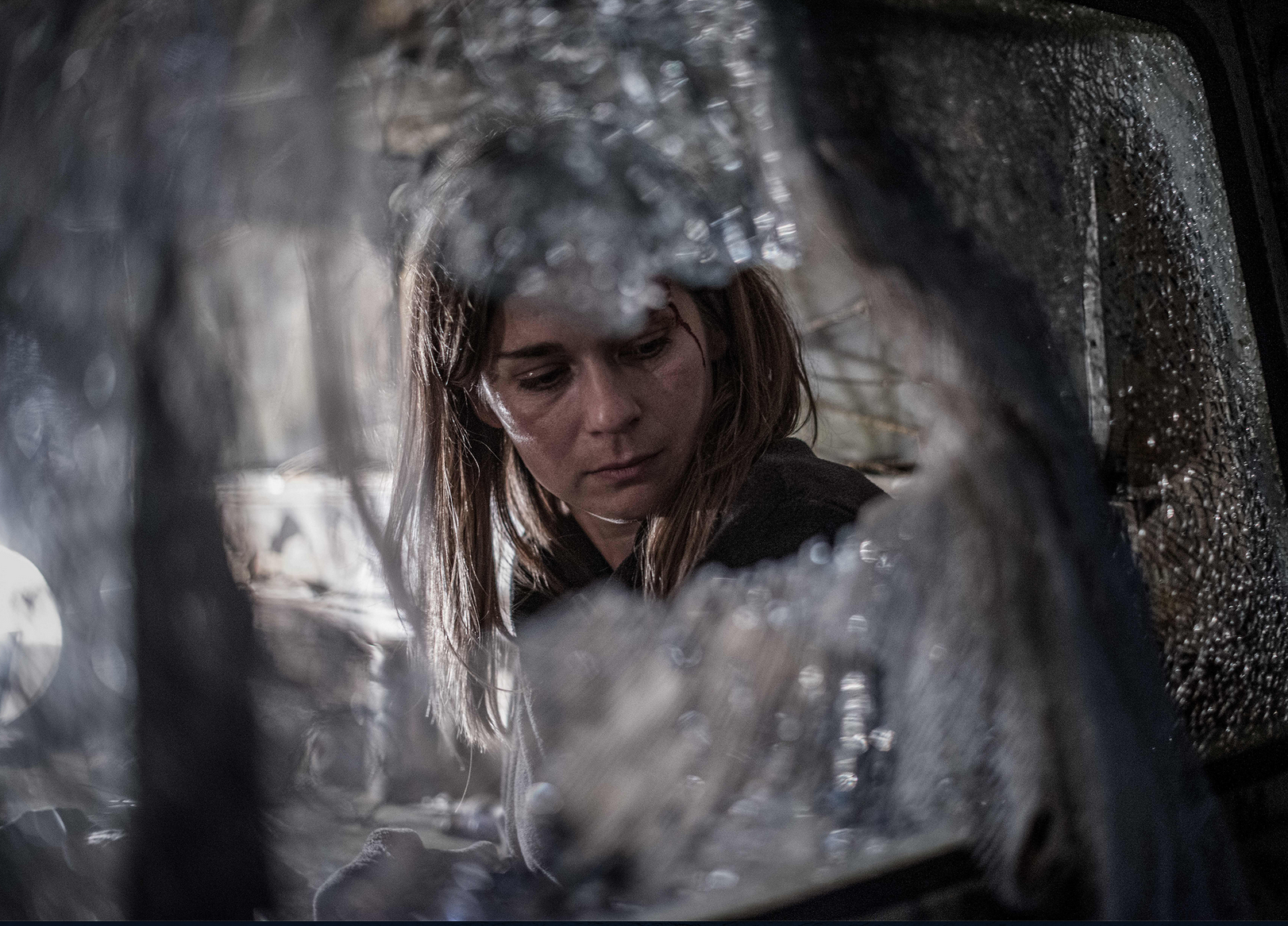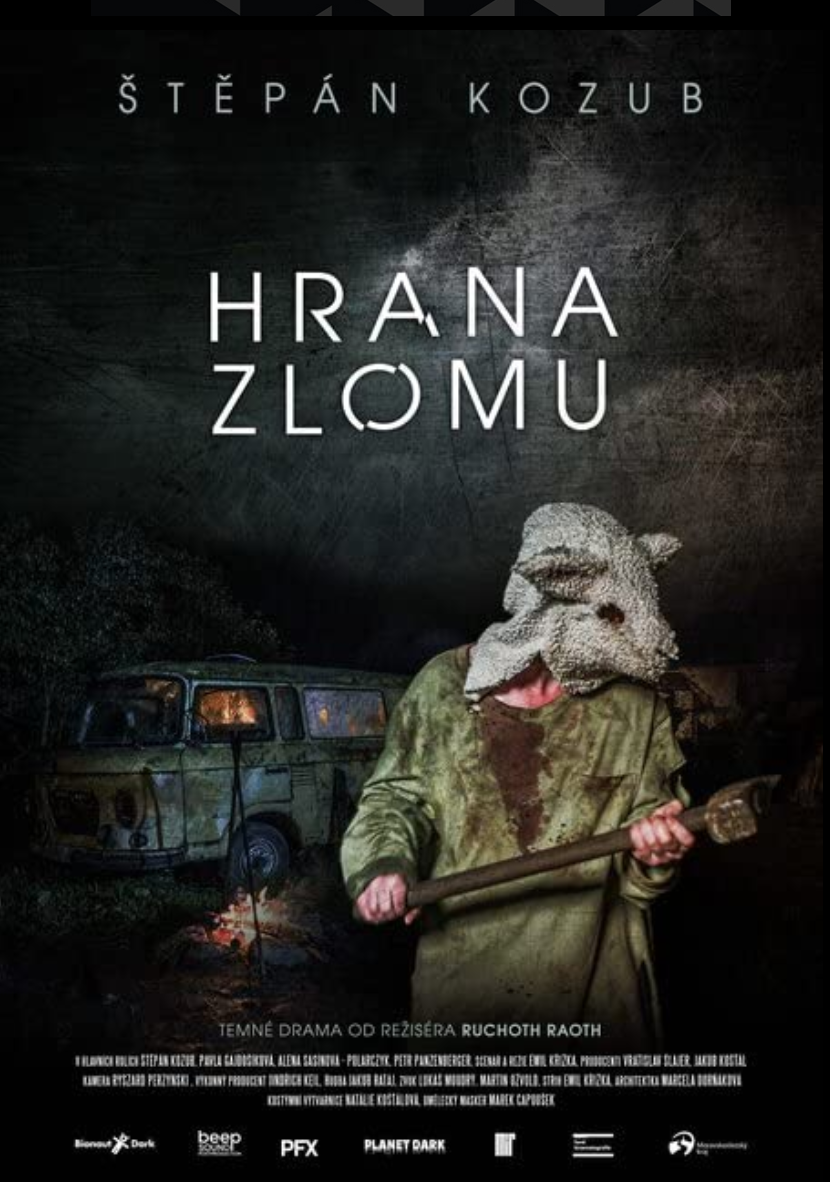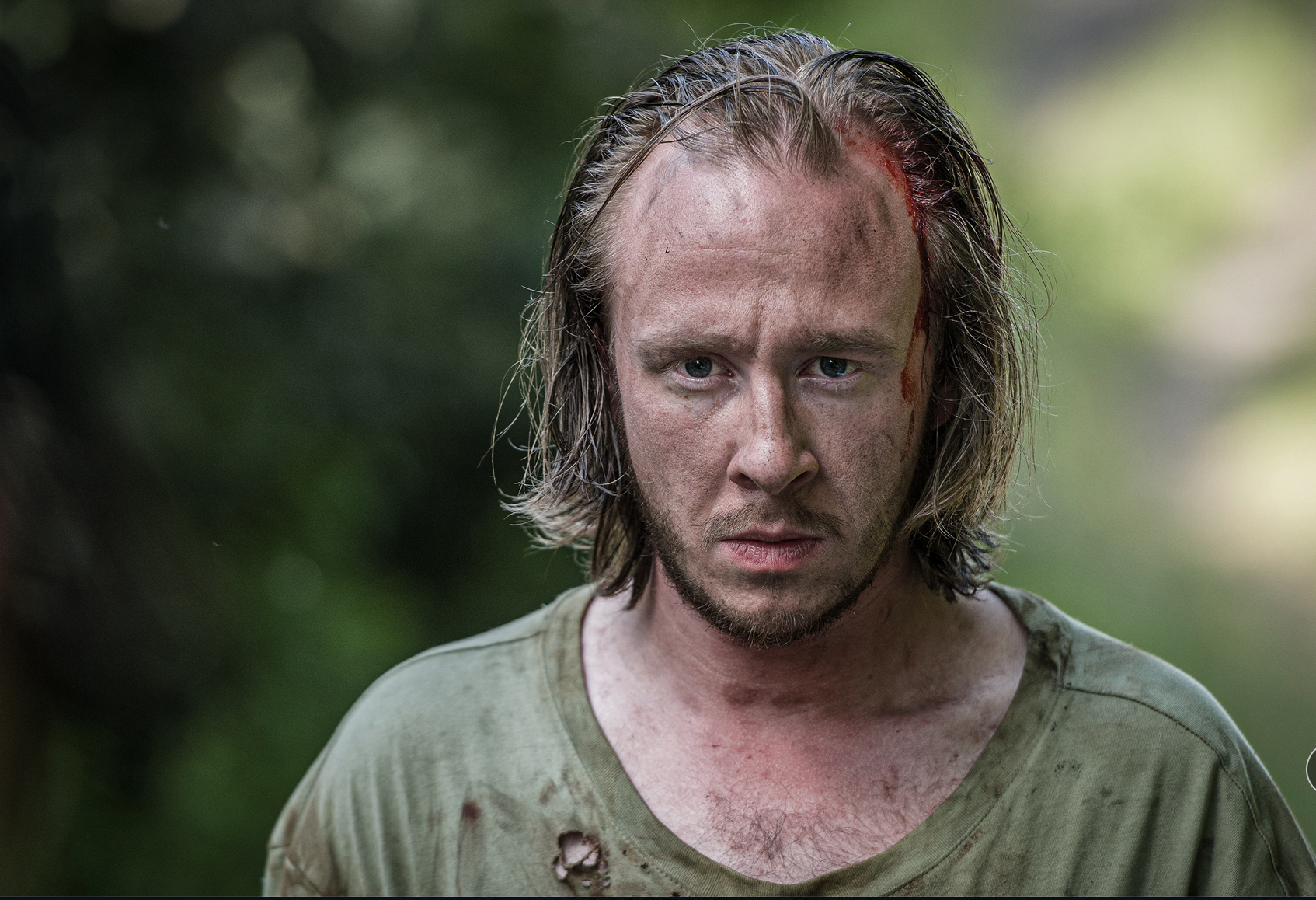[Film Review] Brooklyn Film Festival: Repulse (2021)

After originally debuting at Prague's Febiofest in 2021, Emila Křižky's quietly disturbing film Repulse (Hrana Zlomu) had its North American debut at the Brooklyn Horror Film Festival in October 2022. This horror movie out of the Czech Republic toys with the audience's expectations all the way through. With few exceptions, Repulse is almost totally lacking in dialogue (words aren't spoken until 12 minutes into the film), making it even more of a demented mystery to untangle.
The film opens with an act of violence. A car speeds into a garbage dump, then the door slowly opens, and a woman slides to the ground, clutching her side, clearly in pain. A large figure wearing dark blue pants steps into the frame and drags her away. There's no explanation for how these two people know each other or how they've ended up together in this desolate place, and the film spins back in time to explain why they had the misfortune of meeting.

Repulse then slowly pulls back the curtain on the lives of two very different families. Katerina (Pavla Gajdosíková) represents the more traditional family – she is the woman who is dragged away at the start of the film. At first glance, she and her daughter Sara appear to be living under the thumb of their abusive patriarch Robert (Petr Panzenberger). The trio's home is decorated in icy black and white – in an early scene, Robert pours boiling water on Katerina's hand for her defiant act of selecting a red bowl instead of a black bowl for their child's breakfast. The couple's home seems devoid of any warmth, and instead is pulsating with tension. Sara often has large headphones on, as if the little girl wants to escape the coldness of her abusive home.
As the de facto representation of the second family, Viktor is played by Štěpán Kozub. His style vacillates between baggy dark blue work pants (which is how the audience can identify him as the man in the garbage dump at the beginning of the film) and more flamboyant attire, including animal masks and nightgowns that only emphasize his large frame. He appears lost in almost every scene; he seems to be a prisoner of his home just as much as Katerina and Sara are prisoners in theirs.
In sharp contrast to Katarina and Robert's spartan house, Viktor appears to live in between a crowded and unkempt trailer, and a house crammed full of muted pastels and unorganized knickknacks. Unlike the sterile environment we see at the first family's home, the trailer and house both appear filthy; Robert wears black clothes to strip Katerina's bed every morning, but the Viktor's house appears to have never seen a duster or a mop. It's also full of frightening-looking tools, crude crosses, wires twisted into angels… and a photo of Katarina.

As the scenes of violence in both families grow more disturbing – including spousal abuse, parental abuse and abduction – the full story starts to click into place. Images of broken glass and flowers (whether in a bright bouquet or wilted into shriveled petals) symbolize the dysfunction of these two families, and help the viewer keep track of the frequent time jumps in the film. There are echoes of Gasper Noé's 2002 French film Irréversible, which tells a horrific story entirely in reverse. However, since Repulse travels back and forth in time, it creates even more tension, as the viewer must reorient themselves to the chaotic and disturbing scenes with little context for the timeline in which they are occurring.
Irréversible is not the only film that Repulse pays tribute to. Křižky (who both wrote the directed the film) includes subtle nods to everything from the Australian abduction film Hounds of Love (2016) to the American classic Texas Chainsaw Massacre (1974).
he levels of uncertainty and discomfort the viewer feels as Repulse shifts back and forth between environments and timelines is what makes it stand out. It's the horror movie version of a roller coaster: as soon as you think you'll get a chance to catch your breath, you're confronted with yet another jarring twist as Katerina and Viktor's relationship to one another is finally revealed.

RELATED ARTICLES
When V/H/S first hit our screens in 2012, nobody could have foreseen that 11 years later we’d be on our sixth instalment (excluding the two spinoffs) of the series.
When someone is in a toxic relationship, it can affect more than just their heart and mind. Their bodies can weaken or change due to the continued stress and unhappiness that comes from the toxicity.
If you can’t count on your best friend to check your teeth and hands and stand vigil with you all night to make sure you don’t wolf out, who can you count on? And so begins our story on anything but an ordinary night in 1993…
The best thing about urban legends is the delicious thrill of the forbidden. Don’t say “Bloody Mary” in the mirror three times in a dark room unless you’re brave enough to summon her. Don’t flash your headlights at a car unless you want to have them drive you to your death.
A Wounded Fawn (Travis Stevens, 2022) celebrates both art history and female rage in this surreal take on the slasher genre.
Perpetrator opens with a girl walking alone in the dark. Her hair is long and loose just begging to be yanked back and her bright clothes—a blood red coat, in fact—is a literal matador’s cape for anything that lies beyond the beam of her phone screen.
Filmed on location in Scotland, Ryan Hendrick's new thriller Mercy Falls (2023) uses soaring views of the Scottish Highlands to show that the natural world can either provide shelter or be used as a demented playground for people to hurt each other.

EXPLORE
Now it’s time for Soho’s main 2023 event, which is presented over two weekends: a live film festival at the Whirled Cinema in Brixton, London, and an online festival a week later. Both have very rich and varied programmes (with no overlap this year), with something for every horror fan.
In the six years since its release the Nintendo Switch has amassed an extensive catalogue of games, with everything from puzzle platformer games to cute farming sims to, uh, whatever Waifu Uncovered is.
A Quiet Place (2018) opens 89 days after a race of extremely sound-sensitive creatures show up on Earth, perhaps from an exterritorial source. If you make any noise, even the slightest sound, you’re likely to be pounced upon by these extremely strong and staggeringly fast creatures and suffer a brutal death.
If you like cults, sacrificial parties, and lesbian undertones then Mona Awad’s Bunny is the book for you. Samantha, a student at a prestigious art university, feels isolated from her cliquey classmates, ‘the bunnies’.
The slasher sub genre has always been huge in the world of horror, but after the ‘70s and ‘80s introduced classic characters like Freddy Krueger, Michael Myers, Leatherface, and Jason, it’s not harsh to say that the ‘90s was slightly lacking in the icon department.
Mother is God in the eyes of a child, and it seems God has abandoned the town of Silent Hill. Silent Hill is not a place you want to visit.
Being able to see into the future or back into the past is a superpower that a lot of us would like to have. And while it may seem cool, in horror movies it usually involves characters being sucked into terrifying situations as they try to save themselves or other people with the information they’ve gleaned in their visions.
Both the original Pet Sematary (1989) and its 2019 remake are stories about the way death and grief can affect people in different ways. And while the films centre on Louis Creed and his increasingly terrible decision-making process, there’s no doubt that the story wouldn’t pack the same punch or make the same sense without his wife, Rachel.


![[Film Review] V/H/S/85 (2023)](https://images.squarespace-cdn.com/content/v1/5fe76a518d20536a3fbd7246/1697455043249-K64FG0QFAFVOMFHFSECM/MV5BMDVkYmNlNDMtNGQwMS00OThjLTlhZjctZWQ5MzFkZWQxNjY3XkEyXkFqcGdeQXVyMTUzMTg2ODkz._V1_.jpg)
![[Film Review] Kill Your Lover (2023)](https://images.squarespace-cdn.com/content/v1/5fe76a518d20536a3fbd7246/1697465940337-T55VQJWAN4CHHJMXLK32/56_PAIGE_GILMOUR_DAKOTA_HALLWAY_CONFRONTATION.png)
![[Film Review] Shaky Shivers (2022)](https://images.squarespace-cdn.com/content/v1/5fe76a518d20536a3fbd7246/1696442594997-XMJSOKZ9G63TBO8QW47O/Screenshot+2023-10-04+at+18.59.33.png)
![[Film Review] Elevator Game (2023)](https://images.squarespace-cdn.com/content/v1/5fe76a518d20536a3fbd7246/1696440997551-MEV0YZSC7A7GW4UXM5FT/Screenshot+2023-10-04+at+18.31.42.png)
![[Film Review] A Wounded Fawn (2022)](https://images.squarespace-cdn.com/content/v1/5fe76a518d20536a3fbd7246/1695484054446-7R9YKPA0L5ZBHJH4M8BL/Screenshot+2023-09-23+at+16.42.24.png)
![[Film Review] Perpetrator (2023)](https://images.squarespace-cdn.com/content/v1/5fe76a518d20536a3fbd7246/1695483561785-VT1MZOMRR7Z1HJODF6H0/Screenshot+2023-09-23+at+16.32.55.png)
![[Film Review] Mercy Falls (2023)](https://images.squarespace-cdn.com/content/v1/5fe76a518d20536a3fbd7246/1695482997293-E97CW9IABZHT2CPWAJRP/Screenshot+2023-09-23+at+16.27.27.png)





















![[Editorial] 10 Films & Events to Catch at Soho Horror Film Fest 2023](https://images.squarespace-cdn.com/content/v1/5fe76a518d20536a3fbd7246/1700819417135-299R7L4P0B676AD3RO1X/Screenshot+2023-11-24+at+09.41.52.png)
![[Editorial] 9 Horror Nintendo Switch Games To Play](https://images.squarespace-cdn.com/content/v1/5fe76a518d20536a3fbd7246/1697214470057-3XZXX8N4LYIMDFWS6Z3P/Screenshot+2023-10-13+at+17.20.13.png)
![[Mother of Fears] Mothering in Silence in A Quiet Place (2018)](https://images.squarespace-cdn.com/content/v1/5fe76a518d20536a3fbd7246/1696445921315-HZJ2DZYQIH6VVWXBO2YL/Screenshot+2023-10-04+at+19.52.29.png)
![[Editorial] 5 Female Focused Horror Book Recommendations](https://images.squarespace-cdn.com/content/v1/5fe76a518d20536a3fbd7246/1696441981361-52EQCTJ7AT2QF1927GM7/919xtm6d3fL._AC_UF894%2C1000_QL80_.jpg)
![[Editorial] 9 Best Slashers Released Within 10 Years of Scream (1996)](https://images.squarespace-cdn.com/content/v1/5fe76a518d20536a3fbd7246/1695478839037-LOFHGVM3H6BMSZW7G83M/Screenshot+2023-09-23+at+15.15.11.png)
![[Mother of Fears] Mother Vs. Monster in Silent Hill (2006)](https://images.squarespace-cdn.com/content/v1/5fe76a518d20536a3fbd7246/1695485781119-H6GNP0G3J2TLPAOIABV7/Screenshot+2023-09-23+at+17.11.56.png)
![[Editorial] 9 Terrifying Cerebral Visions in Horror Movies](https://images.squarespace-cdn.com/content/v1/5fe76a518d20536a3fbd7246/1693509801235-X23OL50T1DVGECH0ZJK2/MV5BMjQ0MTg2MjQ4MV5BMl5BanBnXkFtZTgwMTU3NDgxMTI%40._V1_.jpg)
![[Mother of Fears] I Don’t Wanna Be Buried in a Pet Sematary (1989) and (2019)](https://images.squarespace-cdn.com/content/v1/5fe76a518d20536a3fbd7246/1691328766069-QFNAVJOMFZVZ5CLU1RWM/Screenshot+2023-08-06+at+14.23.13.png)

If you know me at all, you know that I love, as many people do, the work of Nic Cage. Live by the Cage, die by the Cage. So, when the opportunity to review this came up, I jumped at it.